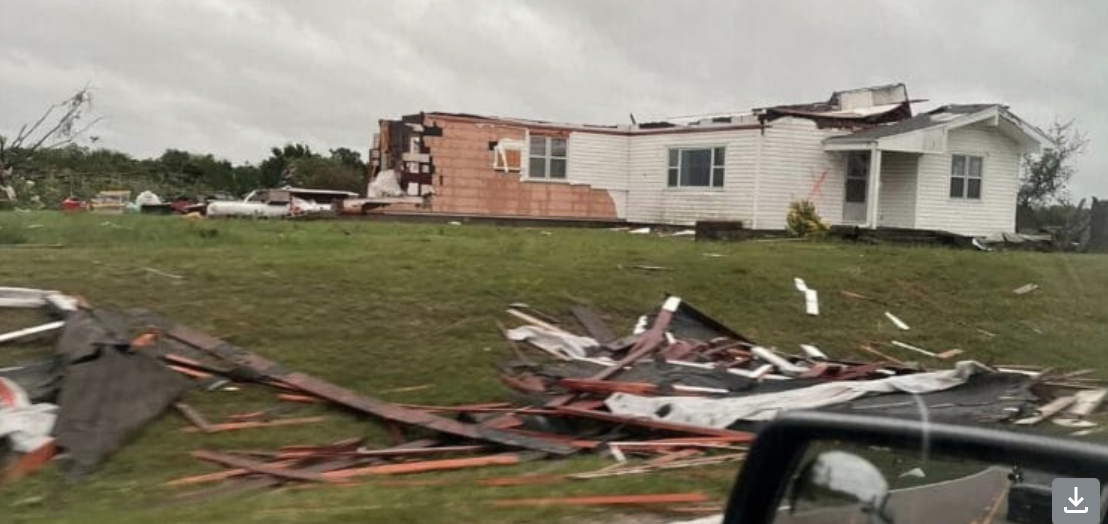
- Details
- By Braden Harper
MVSKOKE RESERVATION, Okla. – The weekend of April 27-28 saw intense severe weather storms that left at least four dead and dozens injured in the state of Oklahoma. Among those killed included a four-month-old infant. The City of Sulphur in Murray County was hit particularly hard by tornadic activity, its downtown area covered in fallen building debris. Closer to home on the Mvskoke reservation, the Morris and Holdenville areas were hit by tornadoes as well. Oklahoma Governor Kevin Stitt declared a state of emergency for 12 counties, and described the aftermath as the worst damage he has seen during his tenure as governor.
Two of the four fatalities from Holdenville were discovered by Muscogee (Creek) Nation Lighthorse Police Officers. Additional areas on the reservation affected by storm damage included Coweta, Wagoner, Okemah, Henrietta and Sapulpa. According to MCN Emergency Management Director Bobby Howard, no MCN tribal facilities were damaged. MCN emergency response departments coordinated with the state, county and municipal first responders to clean up the affected areas and conduct search and rescue efforts. Teams worked tirelessly around the clock through late night hours.
Howard credited the Nation’s new communication system as instrumental in his team’s success in coordinating the larger emergency response effort. His team was able to communicate with one another from Holdenville to Okmulgee and even other counties. This allowed the team to get in contact with dispatch to get ambulances on scene from far distances.
According to Howard, Morris and Holdenville received the brunt of the storms’ wrath.
“Holdenville just because of the loss of life,” Howard said. “Morris had the most structural damage just due to all the tree debris and because it was in town.”
Although the National Weather Service has not officially released a report on the amount of recorded tornadoes, nor the velocity, early estimates believe that the weekend’s storms produced either EF3 or EF4 tornadoes.
MCN Response
In a statement released on the Nation’s Facebook page, it expressed condolences for the lives lost by the storms. The statement reads,
“Our hearts and thoughts are with the communities that have been affected by these storms. We mourn for those we have lost, and we continue to pray for those who have been injured.”
MCN Second Chief Del Beaver made remarks on the storms, expressing sympathy and encouraging the community to come together.
“Our prayers go out to those affected by the storms last night. There are no words to express our sympathies for those who lost loved ones.” Second Chief Beaver said. “In times like these, we are blessed with our partner municipalities that appreciate and understand the importance of a community that works together for each other. This is who we are as Muscogee people. We are resilient and stand together during times like this. Please check on each other and lend a helping hand when needed.”
On April 29 MCN Principal Chief David Hill signed MCN Executive Order 24-03, declaring a state of emergency on the Muscogee Reservation in response to the storms. According to Principal Chief Hill, the declaration will engage the tribe’s emergency response plan and will allow the Nation to coordinate with federal partners on relief and recovery efforts.
Governor Stit is in talks with President Biden to receive federal support for ongoing disaster relief efforts across the state. For citizens who live within the Mvskoke reservation and are in need of disaster response services, contact the MCN Disaster Hotline at 918-732-7911.
Help us defend tribal sovereignty.
At Native News Online, our mission is rooted in telling the stories that strengthen sovereignty and uplift Indigenous voices — not just at year’s end, but every single day.
Because of your generosity last year, we were able to keep our reporters on the ground in tribal communities, at national gatherings and in the halls of Congress — covering the issues that matter most to Indian Country: sovereignty, culture, education, health and economic opportunity.
That support sustained us through a tough year in 2025. Now, as we look to the year ahead, we need your help right now to ensure warrior journalism remains strong — reporting that defends tribal sovereignty, amplifies Native truth, and holds power accountable.
 The stakes couldn't be higher. Your support keeps Native voices heard, Native stories told and Native sovereignty defended.
The stakes couldn't be higher. Your support keeps Native voices heard, Native stories told and Native sovereignty defended.
Stand with Warrior Journalism today.
Levi Rickert (Potawatomi), Editor & Publisher
